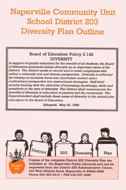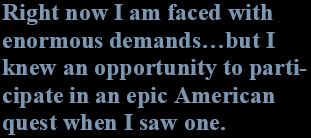Upon the completion of a Diversity Plan for Naperville Community Unit School District 203 (see the plan brochure HERE), I, as committee chair, made these comments to the Board of Education on February 23, 1998.
THOUGHTS ON LEADERSHIP AND DIVERSITY
by Richard R. Guzman
 I had hoped that the things I want to say here could have been part of our diversity plan. But there was not enough time to integrate them carefully into the substance of the plan, and forcing the issue would have taken us beyond agreed committee processes. Then I realized that I was really wanting to speak about things that went beyond the plan any way, so I asked the committee if I could simply add my thoughts as an addendum and speak as an individual. I want to thank the committee for their forbearance. Unofficial as these thoughts are, however, I do want them as part of the record, and so will provide the Board and anyone else who wants them, with copies of what I want to add to our thinking about our diversity plan—which is this:
I had hoped that the things I want to say here could have been part of our diversity plan. But there was not enough time to integrate them carefully into the substance of the plan, and forcing the issue would have taken us beyond agreed committee processes. Then I realized that I was really wanting to speak about things that went beyond the plan any way, so I asked the committee if I could simply add my thoughts as an addendum and speak as an individual. I want to thank the committee for their forbearance. Unofficial as these thoughts are, however, I do want them as part of the record, and so will provide the Board and anyone else who wants them, with copies of what I want to add to our thinking about our diversity plan—which is this:
The diversity plan presented here seeks not only to change processes and structures, it seeks to change a culture, and beyond that to help people change on the inside. But no plan, however finely articulated and well-intentioned, is really up to this task. Though the new processes and structures proposed here will, over many years, contribute to such changes, the success of this plan finally depends on it being backed by commitment and impelled by leadership that goes well beyond the plan itself. This commitment and leadership must come from many individuals, but I urge the Board of Education in particular to continue to give this plan and its implications high priority.
The Board of Education has received training in such areas as how to manage change, how to resolve conflict, and how to analyze, realign and improve systems. In another recent workshop on planning, the board received an outline presenting levels of progress. Progress can be so little as to leave a situation essentially status quo. It can be piecemeal, resulting in mere anecdotes about progress here and there. But we can also have some progress, significant progress, and exemplary progress. I believe the plan presented here will produce some progress, maybe even significant progress, but I want to urge the board to concentrate and apply all its training to the cause of achieving exemplary progress regarding diversity. I would ask the Board to continue developing itself so it can model the commitment and leadership it will take to get us all there. I would also ask its members to model continuing, deep personal change as well.
 Shortly the Board will embark on more training, part of which will detail the differences between management and leadership. We do not want to merely go through the motions, to “play” at diversity, to merely manage instead of lead. Management may plan and budget, but leadership goes beyond that to establish direction. Management may organize and staff, but leadership helps truly align people, forming vital coalitions and communicating direction by words and deeds. Management may control, problem solve and monitor outcomes, but leadership motivates and inspires. In the end, management may produce order, but leadership always aspires to produce not just order, but true change.
Shortly the Board will embark on more training, part of which will detail the differences between management and leadership. We do not want to merely go through the motions, to “play” at diversity, to merely manage instead of lead. Management may plan and budget, but leadership goes beyond that to establish direction. Management may organize and staff, but leadership helps truly align people, forming vital coalitions and communicating direction by words and deeds. Management may control, problem solve and monitor outcomes, but leadership motivates and inspires. In the end, management may produce order, but leadership always aspires to produce not just order, but true change.
The assignment to help facilitate the writing of this plan came along at one of the most inopportune moments in my life. I am faced with enormous demands as a teacher and writer; I am putting lots of effort into the church I attend; and I am facing some of the greatest personal struggles of my life. Nevertheless, I knew an opportunity to participate in an epic American quest when I saw one. Though I have lived most of my life here, I was not born here. I am a first generation immigrant with fleeting, but haunting childhood memories of just getting off the boat. So perhaps more than most people, I am obsessed with what it means to be an American. And this is finally how we must see our efforts here. As important as the processes and figures are, as important as it is to fit our efforts to this particular town at this particular time, we must understand that we are part of an American epic of democracy. The writer James Baldwin, my intellectual patron saint, once wrote that our struggle over race is “not merely shameful, it is also something of an achievement. For even when the worst has been said, it must also be added that the perpetual challenge posed by this problem was always, somehow, perpetually met.” Well, maybe. More often our quest to live together not just with tolerance, but true respect, has alternated between great hope and bitter disillusionment. It is a tiring alternation. But its frequency, and our cautious readiness to engage in it again and again over issues of our diversity is also deeply American. So we continue, hoping that our inevitable shortcomings and failures will not discourage us from continuing to seek each other’s good will.
In composing this addendum, I am admittedly reaching for a language to frame the presentations of this plan I will make on your behalf to the city at large. After our eyes scrutinize the plan with the care it deserves, this language needs to encourage us to lift our eyes to see the greater, American context in which it exists. That greater context can be a source of the commitment we will all need to truly lead and change. I have addressed these remarks mainly to the Board of Education, but in concluding I want to extend this call to leadership and change to all persons truly interested in the cause of greater diversity.